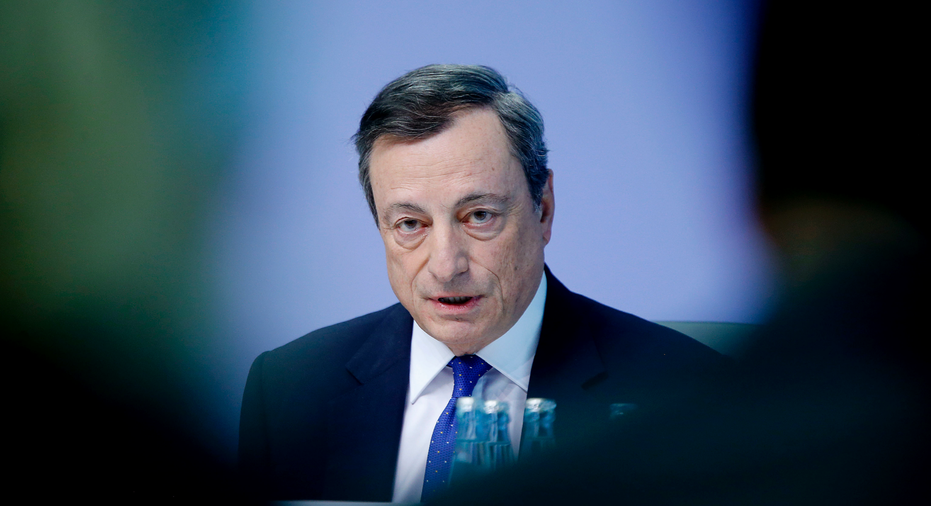European Central Bank's Draghi cagey on stimulus exit

FRANKFURT, Germany – European Central Bank head Mario Draghi did his best Thursday to give no clear signal about the eventual withdrawal of a massive bond-purchase stimulus program, lest markets overreact.
Draghi said the bank's 25-member governing council was unanimous in not even setting a firm date to review the stimulus, in which the ECB is buying 60 billion euros ($69 billion) a month in bonds at least through the end of the year.
The program's goal is to raise inflation to just under 2 percent from the current 1.3 percent, and Draghi said that right now "there really isn't any convincing sign of a pickup in inflation," a remark he repeated several times in slightly different form.
The 19-country eurozone economy is enjoying a solid recovery; the European Commission predicts the eurozone will grow 1.7 percent this year and 1.8 percent next year. Yet Draghi said that prices were not picking up as fast as they had in previous recoveries, for a number of reasons. One was that wages are not rising quickly, reflecting the previous period of near-zero inflation and economic uncertainty. He said that eventually those factors would fade, but added, "Are we there yet? The answer is: we are not."
The central bank is trying to keep investors from anticipating a stimulus withdrawal and sending market interest rates and the euro higher even before it ends. The central bank hates to see that, since it blunts the full effect of the stimulus.
The ECB, the chief monetary authority for the countries that use the euro currency, left its interest rate benchmark unchanged at zero and left untouched the language of its policy statement, in which it said it could even increase the purchases, if needed. That promise is superfluous thanks to a pick-up in economic growth, but underlines the bank's determination not to signal a stimulus exit. The decisions were announced Thursday after a regular meeting of the bank's policy council.
Markets reacted sharply to remarks by Draghi in a speech on June 27 where he spoke about gradual reductions in stimulus as the economy grows stronger. The euro went higher and so did interest yields on longer-term bonds.
Despite all of Draghi's caution Thursday, the euro climbed, rising more than half a cent to $1.1565 at 1355 GMT.
Craig Erlam, senior market analyst at foreign exchange platform Oanda said that the ECB was "fooling nobody" by putting off talk of a stimulus exit.
He added that the ECB "probably doesn't have anything to worry about" in terms of market turmoil: "The market is already working off the assumption that the ECB will gradually phase out bond buying, with the program likely ending by the end of next year."
Analysts think the central bank will have to taper off the purchases next year no matter what because it will start running out of eligible bonds to buy.
The end of the stimulus will eventually have wide-ranging effects on investors, governments and ordinary people. Long-term interest rates should rise. That would mean governments would pay more for interest costs and have less left over for roads, schools and salaries. In particular, an end to the bond purchases could mean more pressure on highly indebted eurozone members such as Italy, which are currently paying very little to refinance their large debt piles.
On the consumer side, home buyers would get less property for a given mortgage amount due to a higher share of interest costs. Conservative holdings such as bank deposits and CDs would become more attractive relative to riskier investments such as stocks.
The ECB pays for the bond purchases from banks with newly created money. The aim is for that money to find its way to companies and consumers in the form of credit. Increasing the supply of money in the economy can in theory raise inflation.
The ECB has made it clear that it will hold its benchmark interest rate at zero well after the purchases end. That means no rate increase is foreseen by analysts until 2019.



















